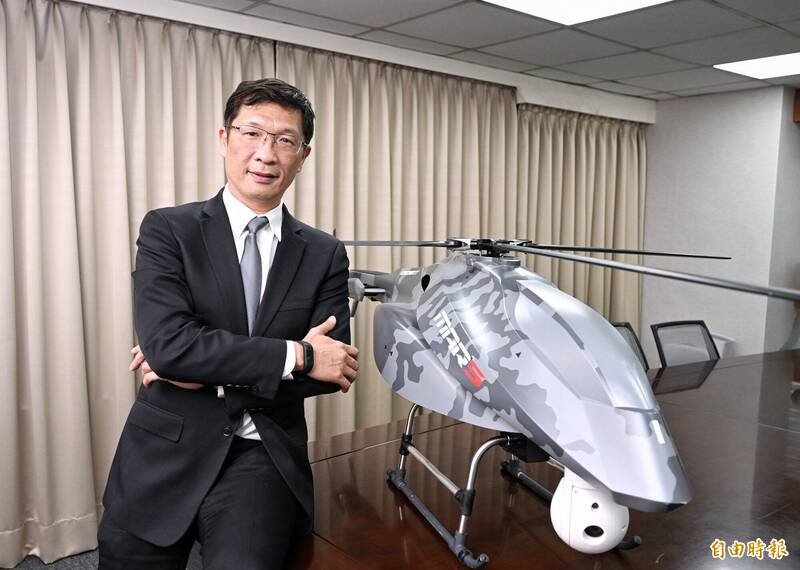Luo Zhengfang, chairman of Jingwei Aerospace, said that strategic industries need national capital to "ignite" to assist manufacturers in their initial growth, so that Taiwanese drone manufacturers have a way to conduct military and civilian general technology research and development at the same time. If agricultural drones are done well, they can be changed during wartime. Hang the bomb and implement the "conversion from peace to war".
(file photo)
[Reporter Wu Zheyu/Report from Taipei] Recently, Jingwei Aerospace signed a cooperation memorandum with the Turkish Aerospace University on February 15th on behalf of the Taiwan UAV national team.
On the 14th, the Chinese Academy of Sciences also publicly displayed five six-type drones, including the Ruiyuan II, which are under development and testing.
In the latest "Drone Readiness Index" (DRI) released by Drone Industry Insights (DII), a business intelligence research platform in the field of drones, at the end of January this year, the UK and Australia tied for first place.
Nine countries, including Taiwan, Belgium, Norway, Malaysia, and China, tied for second place.
Please read on...
At present, Taiwan's military drones are divided into two types of development: "military commercial regulations" and "military military regulations". Among them, "military commercial drones" are manufactured using existing private technology energy, and the Chinese Academy of Sciences assists the national military in performing test verification and technical consulting work; "Military drones" are planned, developed, and produced by the Chinese Academy of Sciences, and are implemented by expanding the industrial release method.
Luo Zhengfang, chairman of Jingwei Aerospace, said in an exclusive interview with this newspaper that Taiwan has all the conditions of a first-class UAV country, from high-end computing chips for autonomous flight of UAVs, to the Weibo wireless communication required for UAV data links, to the UAVs. Electronic sensors, aerospace-grade carbon fiber composite materials, AI automatic target recognition and algorithms, cloud layout of UAV swarm flying network, these are all available in Taiwan.
Other domestic manufacturers such as Sinosteel’s silicon steel sheets, Daya’s cables, TECO and other small motor manufacturers are actively developing general-purpose motors for domestic drones; Important aerospace-grade composite materials for aircraft.
This "Military Commercial Regulations" bid has made a good start, and has attracted more than 50 related domestic and foreign manufacturers to join, and the adjustment of the supply chain is slowly changing.
The purpose of the "Military Commercial Regulations" is to first open 2 to 3 kilograms of drone products, gradually replace the Chinese drone market, provide a basis for manufacturers to make profits, and gradually expand other medium, large and various fields of drones in the future. China position of the product.
Luo Zhengfang mentioned that the current international drone market is mainly monopolized by China's DJI. If there are other options, they can only choose more expensive products from the United States and Japan. Under the trend of product information security concerns, Taiwan can provide additional options, the performance is not inferior to DJI, and the price is lower than that of American and Japanese products. This is an opportunity for Taiwan.
Regarding the fact that the 16 manufacturers that recently participated in the development of the "Military Business Regulations" UAV prototype and the "UAV Defense System" of the Ministry of National Defense were all unsuccessful in the "Regulations on the Development of the National Defense Industry" "Qualification level certification for manufacturers of listed military products", Luo Zhengfang said , Jingwei is still very confident, because Jingwei has already obtained 4 certifications from the Chinese Academy of Sciences. Of course, in this certification, one of the reasons is that the Ministry of Economic Affairs does not understand industrial technology so well.
But the main thing is that the domestic drone industry is still in its infancy. Most of the manufacturers are small and medium-sized enterprises. Their capital is only enough to develop a drone. The government requires the highest specifications, and most manufacturers cannot afford it.
For example, the government initially required each manufacturer to build its own data storage facility with the highest level of confidentiality for the data of drones, or required that entertainment and other drone parts in other fields with low national security concerns be de-sinified. This is something most manufacturers cannot do in one step.
At the same time, the government does not have a single window at this stage. In addition to the Ministry of National Defense, the Ministry of Economic Affairs and the Ministry of Digital Development also have to conduct the same repeated audits. This is also one of the reasons for the increase in manufacturers' costs.
In order to ensure the quality and safety of military products supplied by defense industry manufacturers, the "Qualification Level Certification of Listed Military Product Manufacturers" evaluation system has been implemented for nearly two years, and only more than 10 domestic manufacturers have passed the certification.
(Provided by the Department of Defense)
